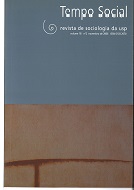O acesso desigual ao conhecimento científico
DOI:
https://doi.org/10.1590/S0103-20702006000200003Palavras-chave:
Conhecimento científico, Desigualdades, Desigualdade categórica, IdentidadesResumo
Aqui são tratadas algumas questões relativas ao acesso desigual ao conhecimento científico que afeta o bem-estar humano: controle sobre sua produção e distribuição e acesso a esse conhecimento por pessoas cujo bem-estar será ou poderá ser afetado por ele. Certamente não fornecerei respostas convincentes e abrangentes às questões, mas pretendo mostrar por que e como elas são importantes. O acesso ao conhecimento científico envolve os temas da ação, da identidade e da liberdade em três aspectos distintos. Em primeiro lugar, a produção e a distribuição de conhecimento científico dependem de agentes informados que, de forma quase inevitável, reservam o conhecimento para vantagem própria e de seus financiadores. Em segundo lugar, o controle sobre o conhecimento científico se organiza em torno de fronteiras definidoras de identidade, que dividem, de um lado, os que têm direitos a esse conhecimento e, de outro, os que carecem de tais direitos. Em terceiro lugar, a superação das barreiras entre os beneficiários e as vítimas do acesso desigual exige, normalmente, a ação heróica de advogados e autoridades políticas.
Downloads
Referências
ANNAN, Kofi. (2003), “A Challenge to the World’s Scientists”. Science 299, 7 mar. p.1485.
BRUBAKER, Rogers. (2005), “Ethnicity without Groups”. In: ADAMS, Julia; CLEMENS, Elisabeth S. & ORLOFF, Ann Shola (eds.), Remaking Modernisty Politics, History, and Sociology. Durham, North Carolina, Duke University Press, pp. 470-492.
DEATON, Angus. (2003), “Health, Inequality, and Economic Development”. Journal of Economic Literature, 41: 113-158.
FREUDENBERG, William R. (2005), “Seeding Science, Courting Conclusions: Reexamining the Intersection of Science, Corporate Cash, and the Law”. Sociological Forum, 20: 3-33.
HIRSCHMAN, Albert O. (1991), The Rhetoric of Reaction. Perversity, Futility, Jeopardy. Cambridge, Harvard University Press.
INTERNET WORLD STATS. (2005), “Internet World Stats. Usage and Population Statistics”. www.internetworldstats.com/top20.htm, consultado em 07/06/2005.
KENNEDY, Donald. (2005), “Bayh-Dole: Almost 25”. Science, 307: 1375.
LANG, James. (2001), Notes of a Potato Watcher. College Station, Texas A&M University Press.
NARAYAN, Deepa & PETESCH, Patti (eds.). (2002), Voices of the Poor. From Many Lands. Nova York/Washington, DC, Oxford University Press/World Bank.
PARAJE, Guillermo; SADANA, Ritu & KARAM, Ghassan. (2005), “Increasing International Gaps in Health-Related Publications”. Science, 308: 959-960.
POSNER, Richard A. (2005), “Intellectual Property: The Law and Economics Approach”. Journal of Economic Perspectives, 19: 57-74.
SCIENCE. (2006), “Qatar Taps Wells of Knowledge”. Science, 312: 46-47, abr.
SEN, Amartya. (1995), “The Political Economy of Targeting”. In: VAN DE WALLE, Dominique & NEAD, Kimberly (eds.). Public Spending and the Poor: Theory and Evidence. Baltimore, John Hopkins University Press, pp. 11-24.
TILLY, Charles. (1998), Durable Inequality. Berkeley, Univesity of California Press.
TILLY, Charles. (2005a), Identities, Boundaries, and Social Ties. Boulder, Colorado, Paradigm Press.
TILLY, Charles. (2005b), “Historical Perspectives on Inequality”. In: ROMERO, Mary & MARGOLIS, Eric (eds.). The Blackwell Companion to Social Inequalities. Oxford, Blackwell, pp. 15-30.
UNDP (United Nations Development Program). (2001), Human Development Report 2001. Nova York, Oxford University Press.
UNDP (United Nations Development Program). (2004), Human Development Report 2004. Nova York, UNDP.
Downloads
Publicado
Edição
Seção
Licença
Direitos autorais (c) 2015 Tempo Social

Este trabalho está licenciado sob uma licença Creative Commons Attribution-NonCommercial 4.0 International License.



